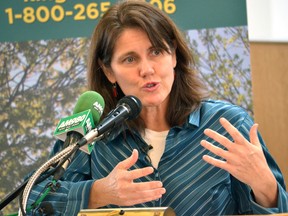London Food Bank launches Spring Food Drive

Article content
The London Food Bank isn’t closing but the nearly 30-year-old organization will be looking for a more effective way to alleviate poverty in the Forest City over the next three years.
On April 10, Food Bank directors Glen Pearson and Jane Roy launched the 27th annual Spring Food Drive amid concerns they planned to close up shop by 2017.
“What we’re talking about is changing,” Roy clarified after a news conference at Kings University College. “When we talk about closing our front doors, potentially, we’re talking about serving the people that actually come directly to the Food Bank in a different way.”
Exactly what that means for the Food Bank isn’t yet clear. Earlier, on April 8, Pearson and Roy were part of the launch of the Poverty Research Centre in London. Part of its goal — and the goal of the many anti-poverty activists involved in the project — is to discover new ways to tackle London’s poverty issue by doing research on the front lines of the problem.
“We want the numbers of people having to need the Food Bank to go down,” Roy said, something that has almost never happened since the Food Bank opened as a temporary response to recession in 1986.
“What we’re doing is we’re asking the Poverty Research Centre about what we can do to make people not have to use the Food Bank. What can we do, in terms of a system, that will work better?”
The London Food Bank currently offers families in need with a bag of groceries per visit valued at around $100. The average family who visits the Food Bank does so about four times per year.
In 2013, 11,459 different families (27,568 individuals) were helped. Of those, 32 per cent visited once during the year, 76 per cent visited five times or less and 2.4 per cent visited every month.
The Food Bank also acts as a warehouse that stores and distributes donated food to other anti-poverty agencies in the city.
While the current model has helped many Londoners in need, Pearson said during an impassioned speech April 10 that it isn’t good enough. What was once considered only a temporary solution during tough economic times has become a constant necessity.
In January 2013, 3870 families visited the Food Bank, their busiest month in history.
“I ask you, what is temporary about that?” Pearson asked. “I think it’s time we started being honest with ourselves as citizens. This is not the legacy that we wish to leave in this community.”
Among the Londoners interested in finding new solutions with the Poverty Research Centre are over 30 faculty members at Kings University College.
“Once they (the Food Bank) have identified the kinds of things they’re interested in, we can do the research to find out what’s out there in terms of evidence to support change,” said Barbara Decker Pierce, director of the School of Social Work at Kings. “We’re very keen on making an impact, and our research having an impact, and we see this as a way of connecting what we can contribute at the university to a problem in our community.”
In the meantime, The Food Bank’s 27th Spring Food Drive begins April 11 and ends April 21 on Easter Monday.
The London District Christian secondary school has prepared 90,000 bags, 55,000 of which will be delivered to London and St. Thomas in the April 11 London Free Press. Volunteers at participating grocery stores will hand out the remainder.
Londoners are asked to donate any time of non-perishable food item. Donations can be dropped off at all 14 of London’s fire stations or at local grocery stores.
Anyone interested in volunteering as well can call 519-659-4045 or email info@londonfoodbank.ca.
Chris.montanini@sunmedia.ca
Twitter: @LondonerChris